11th Century Russia
During the 11th century the unity of Kievan Rus was weakened by the creation of smaller territories and the frequent internecine wars between the sons and then the grandsons of Vladimir the Great. As a result the first signs of the development of separate Russian, Belarusian and Ukrainian nations were shown. The situation deteriorated further after a new enemy began attacking Rus lands from the steppe - the Polovtsians. The century ended with attempts by various princes to unite against the threat posed by the Polovtsians.
Children of Vladimir the Great
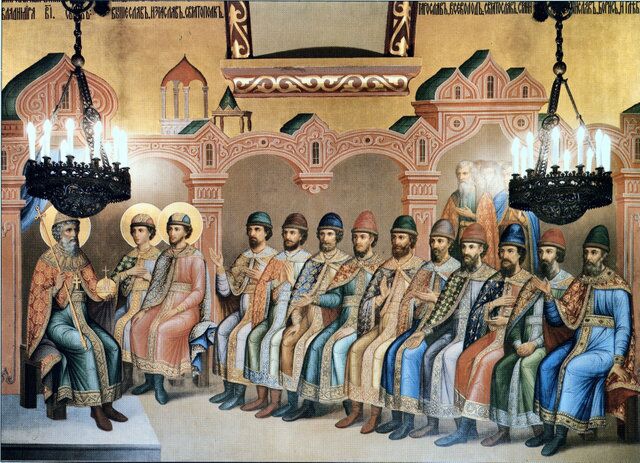
Before Vladimir became a Christian and married Anna he had many wives as permitted according to his pagan religion. As such he had lots of children, around 20. Before his death he decided to allocate part of his territory to each of his sons. Near the end of his life it was suspected that Vladimir intended to leave Kiev, the most important principality, to his favourite son Boris, one of his youngest sons. Fearing they may lose their right to inherit Kiev, two of Vladimir's older sons - Svyatopolk and Yaroslav - rose up against their father in 1014. Vladimir firstly dealt with his eldest son Svyatopolk, Prince of Turov (although it is possible that he was actually the son of Vladimir’s brother Yaropolk) and had him imprisoned in Kiev. However in 1015 just as he was about to march against his son Prince Yaroslavl of Rostov, Vladimir fell ill and died.
War between Vladimir's Sons
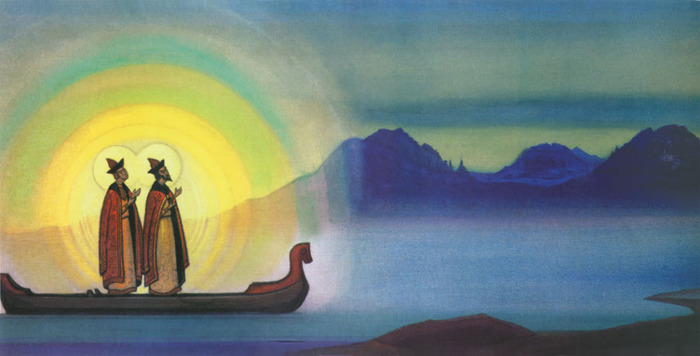
When Vladimir died Svyatopolk was in prison in Kiev and this proved to be of benefit for him as he was the only son of Vladimir to be in the city. Svyatopolk was released and he made himself grand prince of Kiev as the oldest son of Vladimir the Great. He then decided to eliminate his competition by killing his half-brothers. He first sent his men to murder Prince Svyatoslav of the Drevlians. Then he sent them to murder Prince Boris of Rostov and Prince Gleb of Murom. Boris and Gleb had already heard about the murder of Svyatoslav, but they did not flee but also refused to fight their own brother. Instead they decided to meet their deaths as Christians in peace. Several decades later Boris and Gleb were made saints for their refusal to fight their brother; the very first native Russian saints. In contrast, for his treachery Svyatopolk has gone down in history as Svyatopolk the Accursed.
Another one of Svyatopolk’s half-brothers was Prince Yaroslav of Novgorod, but unlike Boris and Gleb he was more than willing to lead an army against his brother. In 1016, with his Novgorod army reinforced by Varangians, Yaroslav was successful and Svyatopolk fled to his father-in-law, King Bolesław I the Brave of Poland. However with Bolesław’s help Svyatopolk was able to retake Kiev shortly afterwards in 1018. Yet Yaroslav did not give up, he once again organised an army and in 1019 he once again defeated his half-brother and his Pecheneg army. Svyatopolk again fled to Poland, but died on the way. Yaroslav was at last unopposed to rule as grand prince of Kiev.
Reign of Yaroslav the Wise
Shortly after winning the throne, one of Yaroslav’s first acts was to reward the city of Novgorod, without whose help he would never had been able to defeat his brother. In gratitude he gave the city many privileges and extra freedoms. This would cause Novgorod to later develop into the powerful Novgorod Republic. Yaroslav also married the daughter of his ally King Olof Skötkonung of Sweden. Yaroslav hoped this alliance would help him keep his throne as he still had more brothers and as such he feared for they would rise up against him. He had one of his brothers, Prince Sudislav of Pskov, imprisoned for the rest of his life, but another, Prince Mstislav of Tmutarakan, proved more difficult. Mstislav raised an army and defeated Yaroslav, who had no choice but to give Mstislav half of Rus.
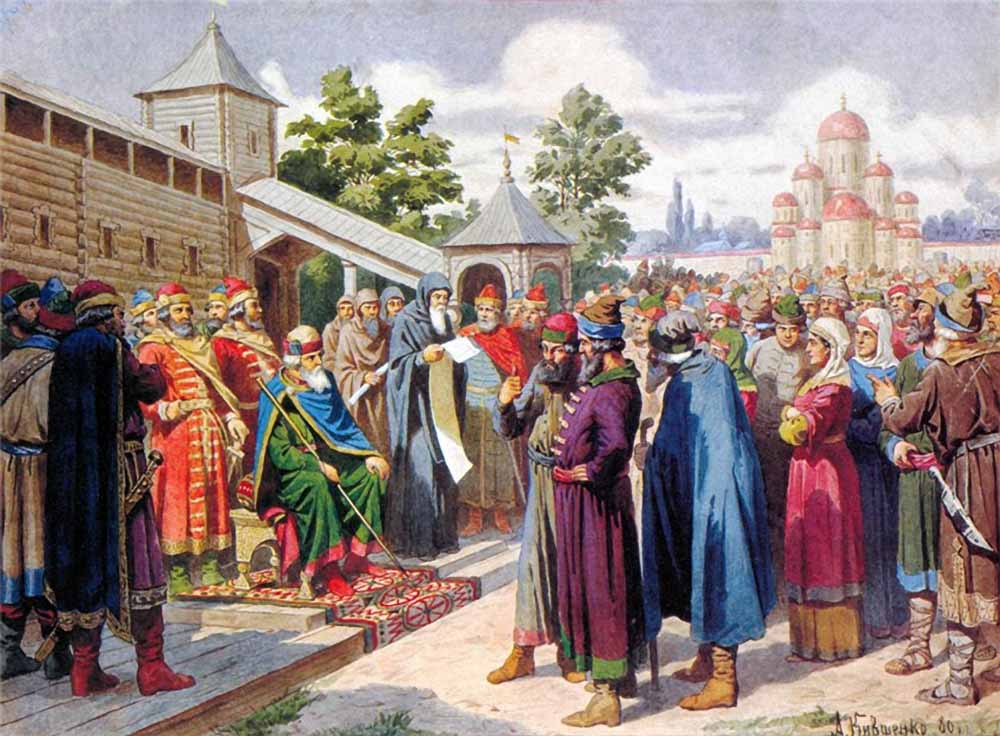
Nevertheless Yaroslav still managed to strengthen and enlarge his lands. Firstly he enacted the first set of laws in Russia which helped him to govern his land more efficiently. This led to Yaroslav being known as Yaroslav the Wise. Then he launched campaigns against the Polish which secured more territory and then against the Byzantines which secured beneficial trading rights. He also built fortifications which ended the threat of Pecheneg raids which were previously very common. After this he commissioned large-scale building works and built St Sophia’s Cathedral in Kiev.
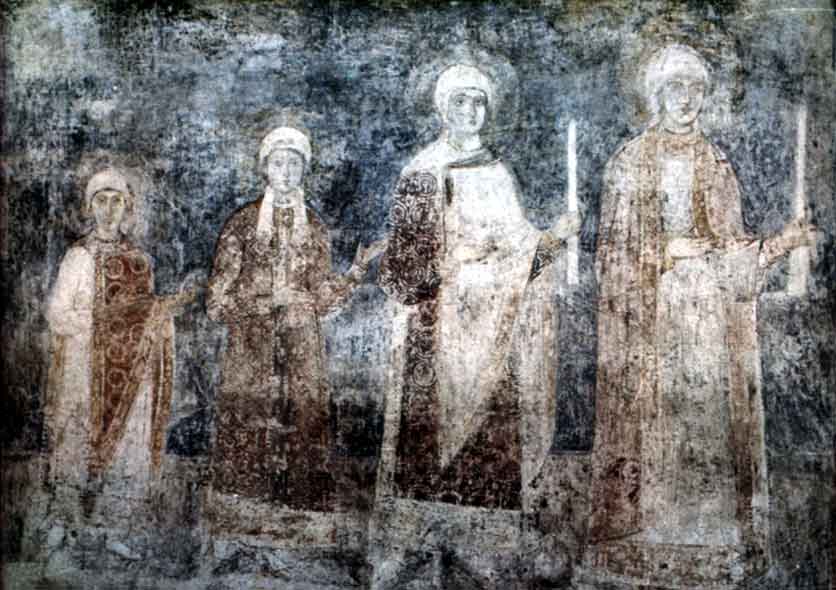
Yaroslav also saw the importance of diplomatic relations with foreign countries and to help this process he married his daughters off to foreign leaders. His daughter Anastasia married the king of Hungary, his daughter Anna married the king of France and his daughter Yelizaveta married the king of Norway. It is also possible that Agatha, the wife of Edward the Exile of England (who spent time at Yaroslav's court) was also a daughter of Yaroslav the Wise. Yaroslav died peacefully after a reign of almost 40 years. His brother Mstislav died before him and which meant Yaroslav regained that half of Rus.
Establishment of the Triumvirate
Yaroslav realised that his lands would only be safe if his sons worked together and did not fight like he did with his brothers. As had happened before, Yaroslav split his territory between all his sons and the three main cities - Kiev, Chernigov and Pereyaslav - were given to his three eldest sons - Izyaslav, Svyatoslav and Vsevolod respectively. However Yaroslav made them promise that they would never fight and that Svyatoslav and Vsevolod would help their eldest brother rule and always obey him. The law of succession was established than once the grand prince of Kiev died, the prince of Chernigov would succeed him and so on. Therefore the throne would pass through brothers before moving to the next generation. This arrangement did appear to be successful immediately after Yaroslav's death as the three brothers worked together ruling Rus as a triumvirate.
Vseslav Bryachislavich of Polotsk
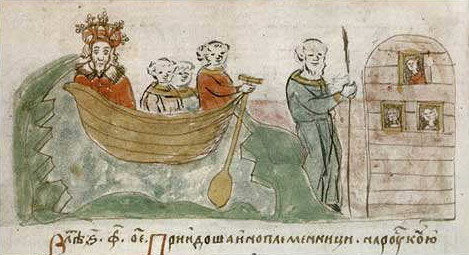
The first threat to the Triumvirate came from a relation of theirs - Prince Vseslav Bryachislavich of Polotsk, who was the grandson of Prince Izyaslav Vladimirovich of Polotsk - the older brother of Yaroslav the wise. The Polotsk branch of Ryurikids could not contend to the Kievan throne by law as Izyaslav Vladimirovich never ruled in Kiev as he died before his father, Vladimir the Great. Vseslav however was not happy with this arrangement and wanted to increase his territory. Firstly he conquered Novgorod, where Izyaslavl of Kiev’s son was prince. The Triumvirate brothers united to liberate Novgorod and captured Vseslav in 1067, imprisoning him in Kiev.
The Triumvirate were also united at the Battle of the River Alta in 1068 against the Polovtsian tribe, a nomadic people related to the Pechenegs who were first mentioned in Russian chronicles in 1055. However the Polovtsians proved too strong for the three brothers and defeated them in battle. This led to panic in Kiev and its citizens rioted against their princes as they believed they could not protect them in case the Polovtsians invaded. Izyaslav I of Kiev fled to Poland to King Bolesław II, to whose aunt he was married. The riot in Kiev gave Vseslav of Polotsk the chance to escape from prison and claim the Kievan throne for himself. However in 1069, upon hearing news that Izyaslav was returning with a Polish army, Vseslav fled back to Polotsk and Izyaslav became grand prince once more punishing all those who betrayed him.
Collapse of the Triumvirate
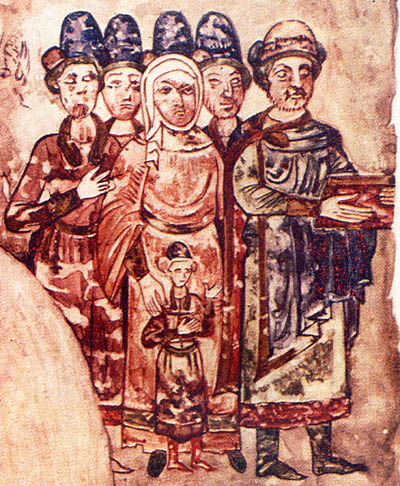
In 1073 Izyaslav I faced more problems and this time it was from his own brother - the Triumvirate between the Yaroslavichy brothers had collapsed and Izyaslav was forced to flee to Poland having been betrayed by his own brother Svyatoslav of Chernigov. Unfortunately for Izyaslav, Svyatoslav had planned ahead and had brought the Polish king’s allegiance. Izyaslav then went to Heinrich IV, the Holy Roman Emperor for help, when he refused Izyaslav sent a request for assistance to Pope Gregory VII. The Pope too though refused to help. It looked like all was lost for Izyaslav until Svyatoslav I suddenly died. Their younger brother Vsevolod, who was at the time ruling Chernigov, became grand prince of Kiev, but decided to return the throne to the rightful prince – his older brother Izyaslav. Izyaslav I returned to Rus and became grand prince for a third and final time.
Battle of Nezhatina Niva
Despite making peace with his brother, Izyaslav I’s throne was still not safe. The new threat came from two of his nephews: Oleg Svyatoslavich, son of Svyatoslav I, and Boris Vyacheslavich of Tmutarakan, son of his younger brother Vyacheslav of Smolensk. Izyaslav I was supported by his brother Vsevolod. Also part of this coalition was Izyaslav’s son Yaropolk and Vsevolod’s son Vladimir Monomakh. They met their enemies at the Battle of Nezhatina Niva, outside of Chernigov. Izyaslav I’s coalition was victorious over the two nephews: Boris was killed and Oleg fled to Tmutarakan. However Izyaslav I also fell at the battle.
Upon the death of Izyaslav I, his brother Vsevolod was the last remaining member of the Triumvirate and ruled Rus once more, this time as the legitimate heir. Vsevolod I was married to a daughter of Emperor Constantine IX Monomachos of Byzantium, giving him even more authority. The remainder of Vsevolod’s reign was relatively peaceful and stable. He was known as an intelligent man who spoke five years. He died peacefully in 1093. At the time Vsevolod I’s popular son, who was known as Vladimir Monomakh after his famous grandfather the emperor of Byzantium, was in Kiev and was even offered the throne, but instead he sent for his more senior cousin – Svyatopolk Izyaslavich, son of Izyaslav I of Kiev.
Polovtsian Invasion
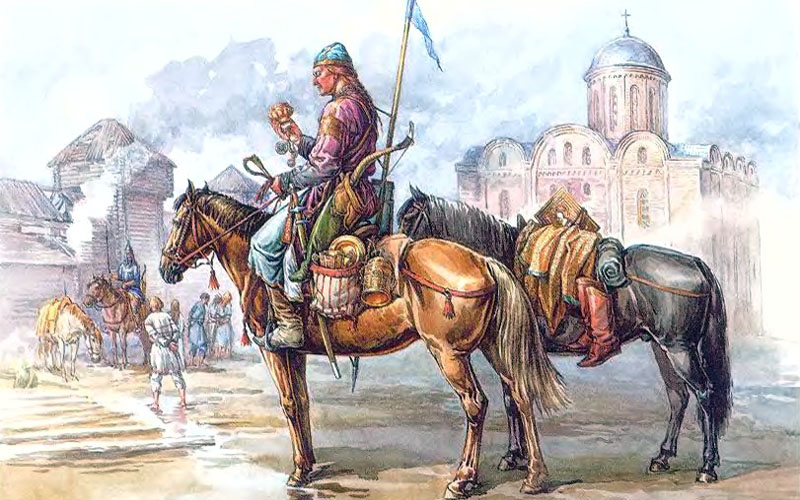
No sooner had Svyatopolk II took up his throne in Kiev in 1093, he faced his first challenge. In May 1093 an army of Polovtsians invaded Rus lands. The Polovtsians sent ambassadors to Svyatopolk II offering peace, but Svyatopolk decided to fight. Svyatopolk requested assistance from his cousins Vladimir Monomakh of Chernigov and Rostislav Vsevolodovich of Pereyaslavl. The three princes meet the Polovtsians at the Battle of River Stugna, but were defeated by the Polovtsians with Rostislav dying in the battle. Afterwards the Polovtsians sacked Kiev lands. Later they captured the city of Torchesk and burned it. Svyatopolk has no choice but to accept the Polovtsians' offer of peace. As part of the deal Svyatopolk married the daughter of Khan Tugokan of the Polovtsians.
Oleg Goreslavich
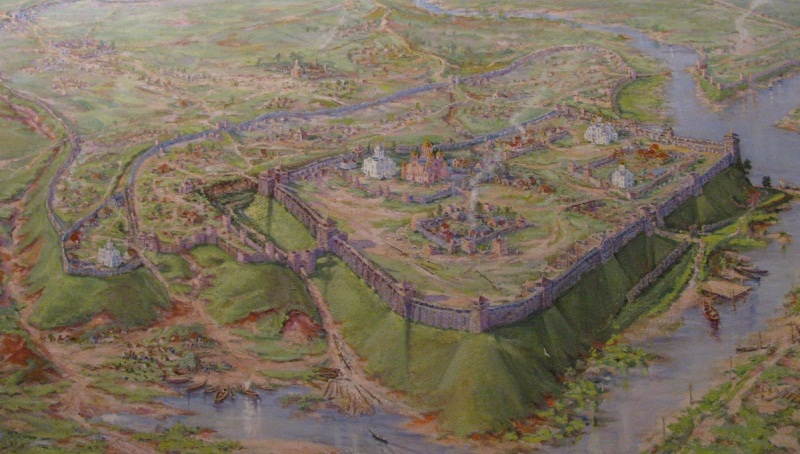
The next challenge Svyatopolk II faced was set by his cousin Oleg Svyatoslavich, who since fleeing from the Battle of Nezhatina Niva had become prince of Tmutarakan. In 1094 Oleg led an army of Polovtsians against Vladimir Monomakh. Oleg desired Chernigov which should have been his as his father had ruled there before Vladimir’s father. After several days of siege Vladimir had no choice but to surrender the city to Oleg and flee to Pereyaslavl. In 1096 Svyatopolk and Vladimir Monomakh launched a campaign against Oleg, but then learned that the Polovtsians had once again invaded Rus. The Polovtsians burned the surrounding areas of Kiev but they were forced to retreat when Svyatopolk’s and Vladimir’s armies arrived. In the battle Khan Turgorkan, Svyatopolk’s father-in-law, and several of his sons were killed. The Polovtsians left Rus lands but once again returned in the same year and raided monasteries outside Kiev. For the troubles Oleg Svyatoslavich caused in Rus affairs - especially for bringing in Polovtsian armies - he was called Oleg Goreslavich - Oleg Son of Sorrow.
Lyubech Congress
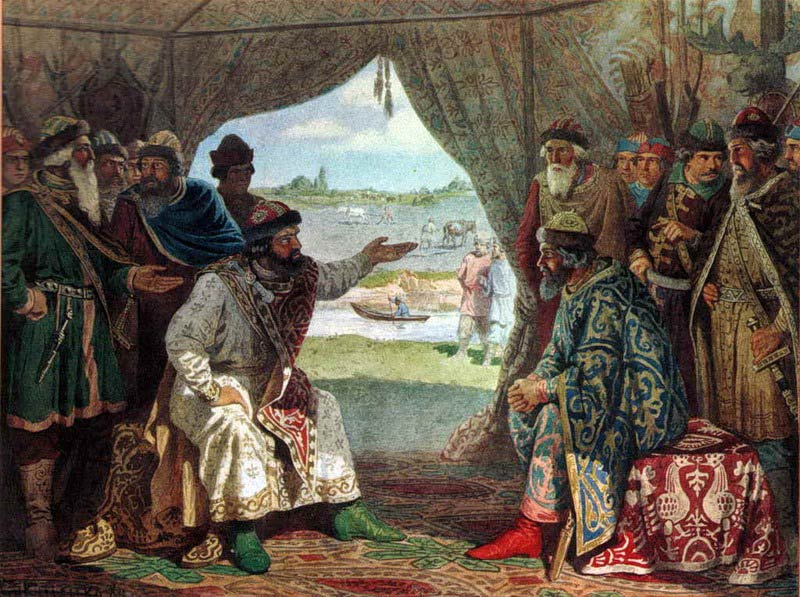
Svyatopolk II and Vladimir Monomakh clearly understood the threat the Polovtsians posed to their lands, they also understood the futility of the ceaseless conflicts between Rus princes. Rus princes would have to unite to be able to deal with the Polovtsians. For this reason Svyatopolk II called a congress between the major Rus princes which took place in the city of Lyubech in 1097. The congress appeared successful as all the princes managed to reach an agreement. They reaffirmed the system of succession: the most senior descendent of Yaroslav the Wise would be grand prince of Kiev, provided though that his own father had been grand prince. Once a grand prince had died his brothers and then cousins would become grand prince, until there were no more living descendents of that generation, then it would pass to the next generation. Each prince would also have his own part of Rus which he could leave to his descendents.
And so it was decided: Svyatopolk II remained grand prince of Kiev. Vladimir Monomakh would receive Pereyaslavl, but also parts of north-western Rus around the city of Rostov, which was traditionally ruled by the prince of Pereyaslavl. It would be Monomakh's descendants who would later rule much of the part of Rus which became modern day Russia. The sons of grand prince Svyatoslav I would receive Chernigov, including the territories of Novgorod-Seversky, Murom and Ryazan. The son of Prince Igor Yaroslavich would rule in Vladimir-Volynsky like his father and the grandsons of Prince Vladimir Yaroslavich of Novgorod would share the territories which would later form Galicia. In the late 12th century Volynia and Galicia would unite into Galica-Volhynia - a key part of what is now Western Ukraine. In addition, the descendants of Izyaslav Vladimirovich of Polotsk shared territories around Polotsk which can be seen as the beginning of a separate Belarusian history.
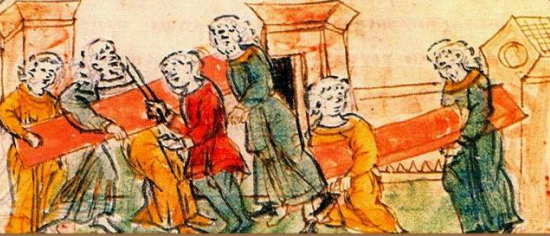
The peace reach at Lyubech did not last long. War broke out in the same year due to a dispute between the princes of Volynia and Galicia and one of the princes of Galicia - Prince Vasilko Rostislavich of Terevolvya - was even blinded by Prince David Igorevich of Vladimir-Volynsky in the process. A crime which horrified the other Ryurikid princes.


